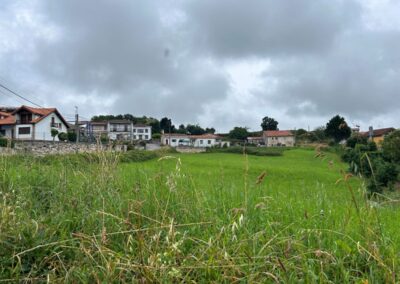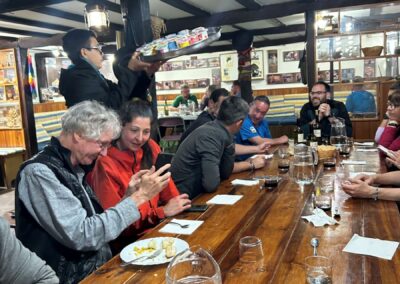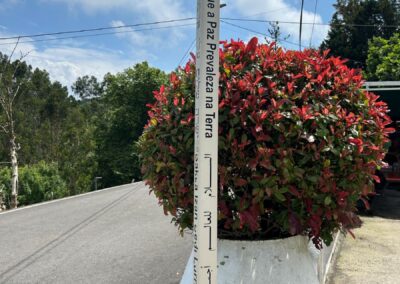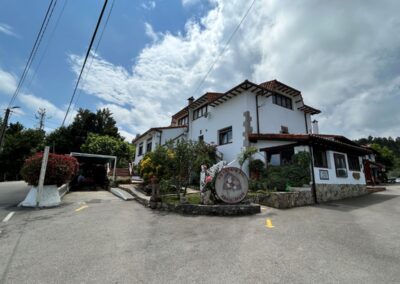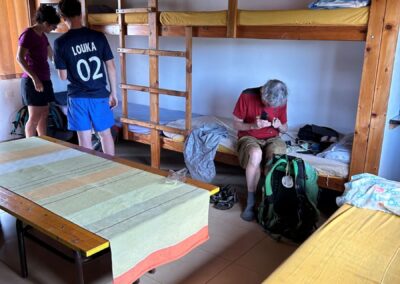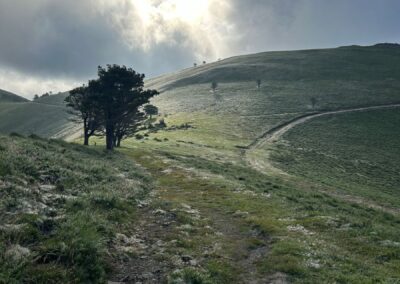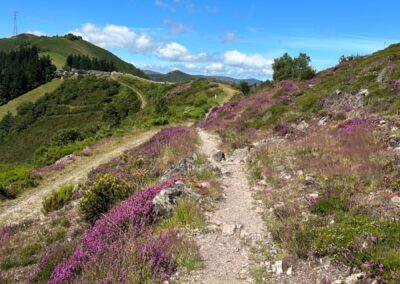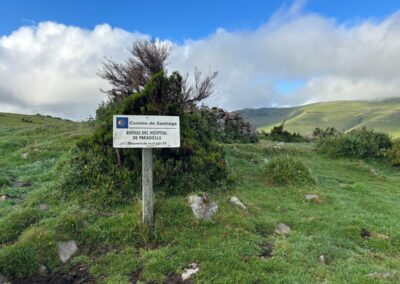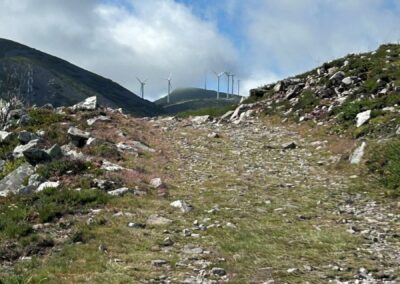As a pilgrimage, the Camino has been around for about 1200 years. When people were walking it, either by choice or by requirement for penance, they were doing so at great peril. While the path I walked wasn’t an easy one, I can only imagine what the early years must have been like… finding food, protection from the elements, getting lost, having shelter for the night… these are things that modern pilgrims may find challenging, but they are well cared for and benefit from many guides, arrows and albergues (the pilgrim hostels).
There were sections of the Camino del Norte and particularly along the Camino Primitivo where services like water, food and accommodation were in rare supply. Stretches of 25kms without a single house or service when you needed to carry everything you would need for the day since you couldn’t rely on a coffee shop or grocery store.
The Camino Primitivo has a particular day called ‘Los Hospitales’ where you climb to the top of a series of mountains and walk along their peaks for an extended period of time. It is described as the most difficult and the most beautiful stage of any Camino. Along ridges of this walk, you find the ruins of old hospitals that were once a key stopping point for pilgrims. The hospitals were purposefully built far outside of towns so that the ill wouldn’t make the townsfolk sick as well. Walking along the ruins of these hospitals gave me a deep sense of walking on hallowed and sacred ground. One of these hospitals closed in the middle of the 20th century, so its ruins are far less ‘ruined’ than many of the others. But I spent quite a bit of time that day in this space, considering the incredible support and gift that these hospitals represented, and those who staffed them.
Hospitals are the epitome of hospitality – care for those who are the most in need, healing of the body in the same way that a host cares for their guest’s needs. In the height of the pilgrimages’ history, a pilgrim would expect to walk up to a stranger’s door, be welcomed in, fed and given a bed to sleep in for the night. When you consider that a good portion of the pilgrims would have been walking as part of a significant penance for something they had done, it isn’t impossible that people who lived on the Camino would be welcoming a stranger into their home whom, at the very least, had a record of bad behaviour. It’s pretty hard to picture it, but those who welcomed in the stranger were considered to be participating in the salvation of those they helped – and by extension, this would benefit their souls too. Imagine! My soul experiences liberty because I am helping you attain yours.
While most of these notions of salvation (in the traditional theological framing) are now largely gone, and most of the pilgrims are walking with little to no religious reasoning or background, the image of what it means to be liberated and lightened on your journey is still very relevant to the experience.
In arriving in the small town of Markina-Xemein, we were offered a bed in one of the old convents that now serves as a pilgrim hostel. For whatever reason that day, I arrived fairly early and was able to set up my bed and sit in the common space for a while with the hospitaleros (volunteers who look after the hostels). It had been a rainy day and I was glad to have warm food and a roof over my head. A pilgrim arrived at the door at the surprisingly late hour of 8pm, covered in mud, appearing to be exhausted from his day of walking. One of the older volunteers stood up, ran over to him, and gave him a hug to welcome him. The pilgrim’s tears suddenly started to flow as if the whole day had finally caught up to him.
In Güemes, a ‘must-stop’ albergue, established on the Camino del Norte just before Santander by a well-known Roman Catholic Priest (Father Ernesto) in the family home of his parents has become a massive compound with more than 100 beds. When you arrive, they ask you to remove your pack, and they feed you soup, bread, water and wine. When you’ve eaten to your heart’s content, they register you and assign you a bed. Before dinner there is a presentation about the history of the space that is in a round chapel dedicated to pilgrims and a hearty communal dinner where everyone sits around big tables and food is given until all hunger is satisfied. In the morning, a big breakfast and a send-off. The whole experience is ‘donativo’, which means you make a private donation in a box near the door. The hospitality offered there has people responding with their own generosity and the whole thing runs entirely on pilgrim donations… and they keep growing.
It made me reflect on how we need to offer to meet people’s needs generously and live within divine assurance that people will respond as they are able to and it will be enough. Can we trust ourselves to offer that kind of hospitality? One that comes from a place that isn’t contingent on whether the person will show up for church or put enough money in the collection plate to pay for the roof repairs.
Often in our churches we want people to join us so that they can fill the pews, largely so that they can help us pay our bills. What if we stopped trying to get people to meet our needs and we tried to meet their spiritual needs first and foremost? Could we tap into an ancient practice of hospitality that seeks to meet the needs of the stranger?
I am deeply convinced that if we, as the church, try to feed the spiritually-hungry stranger rather than focus on our survival, we will not only survive… we will thrive. It’s a radical hospitality that also requires the host to be prepared to change the menu to accommodate, and in the process, be prepared to be transformed.
It’s a vision that’s far more life-giving than when we only seek to meet our own long-established needs. It’s also more rooted in the Gospel…
Rev. Éric Hébert-Daly spent June and July 2024 walking the Camino del Norte, the Camino Lebaniego, the Camino Primitivo, the Camino Inglés and the Camino Muxia/Finistera as part of his sabbatical. He walked 1458kms carrying his backpack across mountains, fields and coasts while holding communities of faith and ministry personnel in prayer. Éric will share some insights of his journey over the coming months.

